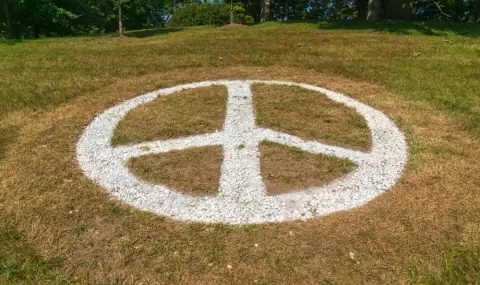On October 20, 1967, Oakland, California the largest demonstration against American involvement in the Vietnam War.
About 4,000 people took to the streets to demonstrate in the fifth day of mass protests against the mobilization of troops for the Vietnam War.
The city was brought to a standstill as protesters set up road barricades to block buses transporting recruits to the army recruitment centre.
Police reinforcements arrived from San Francisco as protests turned violent.
The protesters, many wearing helmets and holding plywood shields, overturned cars and threw bottles, cans and rocks at police.
Four people were injured and seven were arrested.
Nationwide campaign
However, there was no repeat of the scenes three days ago, when Oakland police used batons and chemical sprays to clear the streets.
The harsh treatment of the demonstrators caused outrage across the country.
A demonstration on October 20, 1967 was part of the so-called “Project Stoppage Week” - a nationwide initiative that included peaceful marches in cities across the United States.
It is estimated that up to 40,000 people may join the protest march from the Lincoln Memorial to the Pentagon.
Burn Summons
The demonstrators tried to disrupt the operation of the military centers by encouraging large numbers of young men to return their conscription cards.
Many of them burned their drafts, an illegal act under a law passed by Congress two years ago.
About 50 conscientious objectors have already been sent to prison for their protest.
Up to 7,000 people are believed to have left the country, mainly to Canada, to avoid mobilization.
Recent polls show that American support for the Vietnam War is steadily declining.
President Johnson is under attack from those who believe he was not aggressive enough on Vietnam, as well as those who believe he should withdraw.
A Gallup poll released earlier this month showed his approval ratings had fallen to the point where, if an election were held at this point in his term, he would lose by a wide margin.
The anti-war movement is growing more and more,
while in March 1968, President Johnson announced a pause in the bombing of North Vietnam to begin peace talks.
At the same time, he announces that he will not run for re-election as president.
He left office in 1968 while the war was still raging.
Lyndon Johnson remained active in the Vietnam peace negotiations in an initiative that culminated in the Paris Peace Accords of 1973
He did not live to see the treaty signed. Five days earlier, on January 22, 1973, he died suddenly of a heart attack at his ranch in Texas.
In the same year, the mobilization campaign ended and America switched to an “all-volunteer army”.
Despite the accords, fighting continued in Vietnam until, in April 1975, the government in Saigon surrendered to the communist armed forces of the Viet Cong.
